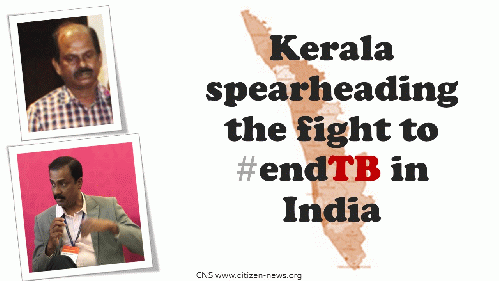
Dr M Sunil Kumar, head of State TB office in Kerala and Dr Shibu Balakrishnan, WHO consultant of RNTCP in Kerala
(Image by CNS (Citizen News Service citizen-news.org)) Details DMCA
As part of the #EndTB Dialogues series launched in lead up to the 50th Union World Conference on Lung Health last month, we got an opportunity for exclusive interview with Dr M Sunil Kumar, State Tuberculosis Officer, Ministry of Health and Family Welfare, Kerala, and Dr Shibu Balakrishnan, World Health Organization (WHO) consultant with the Revised National TB Control Programme (RNTCP) in Kerala.
Kerala's multilayered sustained model of TB care and control is reflected in the reduced incidence rate of disease which was measured at 44 cases per 1,00,000 people, against the national average of 199 cases per 1,00,000 people. The annual decline rate of TB incidence in the state is 3%, which, again, is much higher than the national average.
Kerala is equipped to offer universal DST to all the diagnosed TB cases in the private and public sector. It has achieved 69% universal DST for rifampicin with CBNAAT. Additionally, 5 districts offer universal DST for isoniazid also through line probe assay. Prevalence of rifampicin resistance in TB infected people in Kerala is 1% and isoniazid resistance is also less than 2%.
People's movement against TB
Kerala's TB elimination activities have grown into a people's movement against TB. At the grassroot level there are self-help groups called 'Kurmishri' who are involved in the TB control programme. The healthcare portal of the Kurmishri network meets once every quarter. Health inspectors attend these group meetings in their jurisdiction where health related issues are discussed and symptomatic TB patients are directed to public health system. Also district panchayats or the local self-governments provide nutritional and housing support to TB patients and their families.
TB mapping and active case-finding
In 2018, Kerala launched a house to house survey to test every resident of the state for TB and to map vulnerable populations with a view to monitor them regularly. 87% of the Kerala's population - which means 2,45,00000 people - was mapped by trained healthcare workers (including local/ village level health workers, social health activists, medical staff, etc ). Out of these only 352 new cases of TB were found. In this active case-finding exercise all persons were scored on 13 health parameters. The survey found that 3.5% of Kerala's population is vulnerable to TB and 50% of Kerala's active TB cases come from the pool of people with latent TB infection (LTBI). These people with LTBI are now screened for TB once every 3 months by the field staff.
A new surveillance system has been in place at the district level since the last 2-3 years under the leadership of district TB officers. Under this system, pharmacists have to maintain the records of sale of TB drugs and this data is collected from the pharmacies in every district. At the state level, monthly sales data of TB drugs is obtained from the drug controller's office of Kerala. Names of private doctors giving TB treatments are tracked and forwarded to the respective districts to ensure that TB cases of the private sector are notified.This helps in identifying the missing cases that are getting treatment outside the existing public health system.
(Note: You can view every article as one long page if you sign up as an Advocate Member, or higher).





